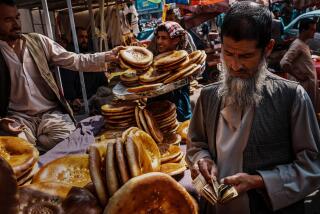Keep Money Worries in Check While on the Road
- Share via
Travelers checks, cash, credit cards . . . rupees, shillings, yen. The last thing you want to worry about on an overseas vacation is handling money.
A two-week holiday in one or two countries may require only a couple of packets of travelers checks, no more. But longer journeys require some thought to make handling money the least of your concerns.
Before we started on our 1 1/2-year trip to Europe, Africa and Asia, my fiance and I worried about exchanging, receiving, carrying and protecting our money while traveling. How were we going to handle thousands and thousands of dollars, on our own, through the jungles of Borneo, the beaches of southern India and the Nubian desert of the Sudan?
We were warned to carry only travelers checks, yet we found that to beinadvisable in areas where cash has the most value. In Sri Lanka, for example, the exchange rate is better for travelers checks. Yet in many parts of neighboring India, the rate is substantially better for dollar bills.
In many countries, banks will cash travelers checks only on weekdays during working hours, which vary from place to place. Unanticipated bank holidays are common. If you need local currency on a Saturday night, it seems best to have U.S. cash, which can be exchanged in shops, restaurants and clubs.
Cashing Checks
If you are a guest at a luxury hotel you usually will have no problem cashing travelers checks there, but the exchange rate can be extremely poor. And luxury hotels are usually only in the larger cities.
In some cases our travelers checks were of no value. Yet we were able to exchange dollars almost everywhere from the slopes of Mt. Kilimanjaro to a tiny island in the Philippines and a hill station in Burma. Even in Paris, where we arrived by bus from England at 5 a.m. on a Sunday, we were able to exchange dollar bills for francs with other tourists.
Exchange rates in foreign countries vary not only for travelers checks as opposed to cash, but also in the money exchange institution used. Many towns we visited have official money exchange offices, which have rates that are much better than the banks’.
Exchanges on the street, although commonly made by travelers, must be approached with caution. Tricksters prevail.
For every exchange, we made our calculations beforehand, so we knew the amount of local currency we were to receive for a given amount of dollars.
For Extended Travel
Whether in cash or checks, how does one obtain the amounts necessary for extended travel? For us, it hardly seemed advisable to carry more than a few thousand dollars at a time.
A must is a credit card with which you can draw U.S. dollars overseas. But service charges for drawing on credit cards are usually very high.
We found it easy to have U.S. dollars cabled from our bank in the United States to corresponding foreign banks. Many large banking institutions with cabling capabilities have overseas representatives.
With only an overnight wait from request to payment of funds, we had dollars cabled to such places as Penang, Malaysia; Nairobi, Kenya, and Colombo, Sri Lanka.
Most foreign banks remit a certain percentage in cash and the remainder in travelers checks, which is fine, because it’s best to have both.
Receiving funds by cable from your bank at home is especially handy if you are earning the funds while you are traveling. Earnings from business or investments are deposited to your account, which you draw upon by cable as needed. Make arrangements ahead of time and always have your account number with you.
As important as receiving money is protecting it. We felt safe with our cash in money belts worn around the waist (some say that belts worn over the shoulder are more comfortable). With our money thus hidden, we felt confident walking the streets of Cairo at 2 a.m. looking for a hotel and snorkeling at a Southeast Asia coral reef (with cash wrapped in a plastic bag).
Using Hotel Safe
Most of the time, however, we were able to deposit our cash in our hotel’s safe. Count the money in the presence of the hotel clerk and get a receipt. Several times we heard bewildered travelers, upon retrieving their money, say, “But I thought we had more than this.” Requesting a receipt puts all at ease.
Most travelers abroad hear stories about devastating robberies. These may be true, but we found such experiences to be far from the norm although we did have to discourage a few amateur pickpockets.
We came close to losing money only once, when we carelessly left a billfold containing a $100 bill and credit card under the mattress of a $5-a-night Kenya hotel. After crossing the border into Tanzania, we realized our mistake and notified the hotel manager by telephone.
When we returned to that Kenya town a month later, the manager proudly returned our billfold containing the cash and credit card. He may have seldom seen that much money, yet he said, “We are all part of the same race, the human race. We must help each other.” I certainly felt proud to be a part of that race.
On our trip to 25 countries, handling money was easy, as a result of a little common sense, caution and planning.
More to Read
Sign up for The Wild
We’ll help you find the best places to hike, bike and run, as well as the perfect silent spots for meditation and yoga.
You may occasionally receive promotional content from the Los Angeles Times.






